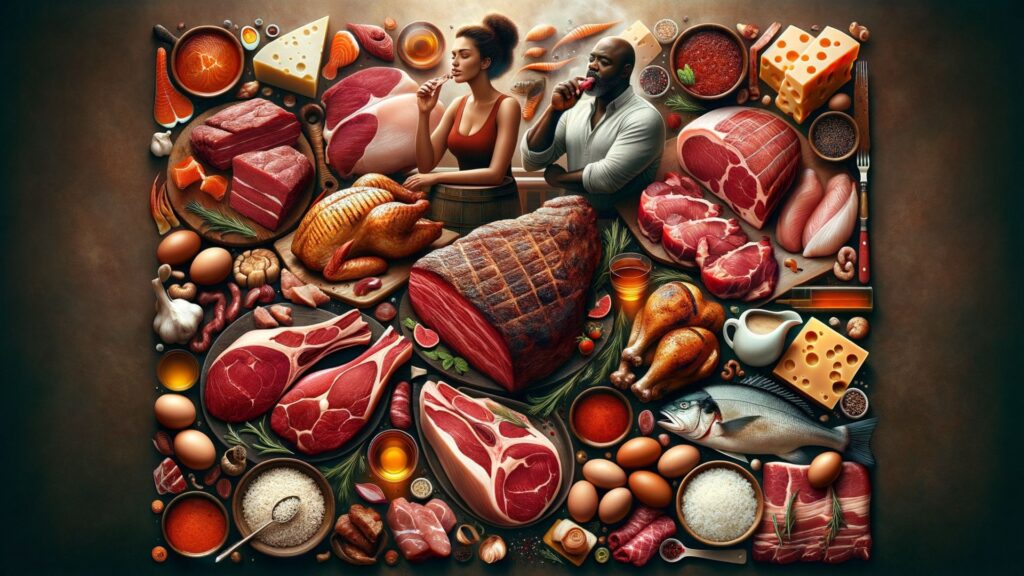Carnivore Diet While Traveling: Hacks to Stay on Track While Exploring, Keto Diet Included
Traveling can sometimes pose challenges for individuals with specific dietary needs, such as those following a strict carnivore diet. The carnivore lifestyle, which involves primarily consuming animal products like fresh meat and hard cheeses, may seem daunting to maintain while on the move.
However, with the right strategies and preparation, it is possible to stay on track with your dietary goals and adhere to the core principles of the carnivore diet even when traveling. One key strategy for staying on track with a carnivore diet while traveling is to plan ahead and do some research on potential dining options at your destination.
Look for restaurants that serve high-quality cuts of meat or are willing to accommodate special dietary needs. You can also consider bringing your own snacks and meals, such as beef jerky, hard-boiled eggs, or cheese sticks, to have on hand when you’re on the go.
Another important aspect of maintaining a carnivore diet while traveling is to communicate your dietary restrictions clearly to restaurant staff and servers. Don’t be afraid to ask questions about how meals are prepared and inquire about any hidden ingredients that may not be carnivore-friendly. Many restaurants are willing to accommodate special requests, so don’t be shy about asking for modifications to suit your needs.
If you’re staying in a hotel or Airbnb, consider cooking your own meals using a portable grill or stove. This will give you greater control over the ingredients you consume and ensure that you stick to the carnivore diet.
Understanding the Basics of the Carnivore Diet
The carnivore diet is a dietary regimen that emphasizes the consumption of animal-based products while excluding plant-based foods. Advocates of this diet believe that it can lead to various health benefits, especially for individuals with autoimmune conditions.
By focusing on animal sources of protein and fat, followers of the carnivore diet aim to eliminate potential dietary triggers and improve their overall well-being. Some of the key principles of the carnivore diet include eating only meat, fish, eggs, and animal fats, while avoiding fruits, vegetables, grains, legumes, and processed foods. Proponents of the diet claim that eliminating plant foods can reduce inflammation, improve digestion, increase energy levels, and promote weight loss.
However, critics of the carnivore diet argue that it is not nutritionally balanced and may lead to nutrient deficiencies over time. They suggest that a diet rich in a variety of fruits, vegetables, whole grains, and legumes is essential for maintaining overall health and providing the body with essential vitamins, minerals, and fiber.
Before starting any new diet, it is important to consult with a healthcare provider or registered dietitian to ensure that it is safe and appropriate for your individual needs. Additionally, it is important to listen to your body and make any necessary adjustments to ensure that you are meeting your nutritional requirements while following the carnivore diet.
Benefits of Following a Carnivore Diet
Those who follow a carnivore diet often report improvements in energy levels, mental clarity, and weight management. Additionally, some individuals experience relief from digestive issues and inflammation when adhering to a carnivore diet.
People with specific dietary restrictions or looking to simplify their food choices may find the carnivore lifestyle appealing. Furthermore, proponents of the carnivore diet argue that it mimics the way our ancestors ate and can be more environmentally sustainable than a diet heavy in processed foods and plant-based alternatives. However, it’s important to note that this diet is not suitable for everyone and can be challenging to maintain long-term due to its restrictive nature.
It’s essential for individuals considering a carnivore diet to consult with a healthcare professional or nutritionist to ensure they are meeting their nutritional needs and to monitor their health closely. It’s also important to source high-quality animal products from ethical and sustainable sources to promote animal welfare and environmental sustainability.
Tips for Maintaining a Carnivore Diet While Traveling
When traveling on a carnivore diet, it’s important to plan and pack carefully to ensure you have access to suitable food options. By selecting the right carnivore-friendly foods like beef jerky, hard cheeses, canned fish, and hard-boiled eggs, you can stay true to the diet’s principles even when on the move. Planning ahead and packing non-perishable items can help you avoid straying from your dietary goals while away from home.
Additionally, it can be helpful to research restaurants or grocery stores at your destination that offer carnivore-friendly options. Many restaurants now offer customizable menus, so don’t be afraid to ask for substitutions or modifications to fit your dietary needs. If you’re staying in a hotel, consider bringing a small cooler or requesting a mini fridge to store your perishable items.
It’s also important to stay hydrated while traveling, so be sure to pack plenty of water or look for mineral water options that don’t contain added sugars or artificial sweeteners.
Carnivore Diet On The Go
Challenges of Sticking to a Carnivore Diet While Traveling
One of the main challenges of maintaining a carnivore diet while traveling is the availability of suitable food options, especially in unfamiliar locations. Limited access to fresh meat and hard cheeses can make it difficult to stay on track with your dietary requirements. Navigating airline menus and local restaurants that cater to carnivore dietary needs can also be a challenge.
Additionally, finding high-quality and nutrient-dense food can be a struggle, particularly when fast food or processed options are more readily available. It may require extensive planning and research to find suitable carnivore-friendly meals while on the go.
Another challenge is staying consistent with your diet when faced with social situations or cultural expectations that may not align with a strict carnivore lifestyle. It can be difficult to explain and justify your dietary choices to others, especially when dining with friends or family who may not understand or support your decision to eat only animal products.
Furthermore, dealing with potential digestive issues or discomfort while traveling can further complicate things.
Changes in routine, time zone differences, and stressful travel situations can all impact digestion and overall well-being, making it even more important to prioritize your dietary needs and listen to your body’s signals.

How to Find Carnivore-Friendly Options on the Road
To overcome the challenges of traveling on a carnivore diet, you can research and identify carnivore-friendly restaurants or grocery stores at your destination beforehand. Utilizing online resources and apps that list carnivore-approved eateries can help you locate suitable food options.
Additionally, packing your own carnivore snacks and easy-to-prepare meals can provide a convenient solution while on the road. Additionally, reaching out to hotels or accommodations in advance to inquire about their meal options and see if they can accommodate your dietary needs can also be helpful. Bringing along some essential cooking tools like a portable grill or small stove can allow you to prepare your own meals even when on the go.
It’s important to plan ahead and be proactive when traveling on a carnivore diet to ensure you have access to the appropriate food options. By taking these steps, you can enjoy your travels without compromising your dietary preferences.
Strategies for Packing Carnivore Diet-Friendly Foods
When preparing for travel, consider packing essentials like beef jerky, cheese, and canned fish that align with your carnivore dietary requirements. Non-perishable items such as nuts, seeds, and low-carb snacks can serve as convenient options for maintaining your dietary goals while on the move. Having a selection of carnivore-approved foods readily available can help you stay true to your diet’s principles throughout your journey.
Additionally, it may be helpful to research restaurants or grocery stores at your destination that offer carnivore-friendly options. Planning ahead and knowing where you can find suitable food choices can make it easier to stick to your carnivore diet while traveling.
If you anticipate challenges in finding suitable food options, consider packing a small cooler bag with perishable items like hard-boiled eggs, cooked bacon, or deli meats to have on hand for quick and easy meals. This can help ensure that you have access to carnivore-approved foods even in situations where suitable options may be limited.
Remember to also stay hydrated by drinking plenty of water throughout your travels, as staying properly hydrated is important for overall health and well-being. Consider packing a refillable water bottle to have on hand during your journey.
Carnivore-Friendly Foods
Best Carnivore Diet Snacks for Traveling
Some of the best carnivore diet snacks for traveling include beef jerky, hard-boiled eggs, and cheese. These portable and nutrient-dense options can provide you with the necessary protein and fat to sustain you during your travels. Opting for high-quality, minimally processed snacks can help you adhere to your carnivore diet while on the go.
Other great carnivore diet snacks for traveling include pepperoni slices, pork rinds, and canned sardines or tuna. These options are convenient to pack and can be easily stored in a cooler or bag while on the road.
Additionally, nuts like macadamia or pecans can also be a good snack option for some carnivores, as they are high in fat and low in carbohydrates.
Just be sure to choose unsalted varieties and enjoy them in moderation. Jerky made from other types of meat like turkey or salmon can also be a tasty and portable option for carnivores on the move. Remember to always read labels and choose snacks that are free from added sugars, preservatives, and other non-carnivore ingredients.

Meal Ideas for Eating Carnivore on the Go
When looking for meal ideas while traveling on a carnivore diet, consider options like grilled meats, canned seafood, and cheese plates. These simple yet satisfying choices can be easily prepared or purchased on the road. By prioritizing whole, animal-based foods, you can enjoy flavorful meals that align with your dietary preferences.
Additionally, you can explore local butchers or farmer’s markets to find high-quality cuts of meat or fresh seafood to grill at your campsite or Airbnb. You can also look for restaurants that offer steaks, burgers, or other meat-centric dishes that cater to a carnivore diet.
If you’re in a pinch, canned tuna, salmon, or sardines are convenient options that can be easily stored and enjoyed on the go. Just be sure to read the labels and choose varieties that are packed in water or olive oil without any added sugars or preservatives.
Cheese plates are another versatile option for carnivores on the road. You can pick up a variety of cheeses, deli meats, and nuts to create a satisfying and nutrient-dense snack or meal. Pair it with some olives or pickles for extra flavor and enjoy it as a quick and easy option for when you’re on the move.
Tips for Finding Carnivore-Approved Restaurants While Traveling
While traveling, it can be beneficial to seek out carnivore-approved restaurants or eateries that offer suitable menu options. Look for establishments that prioritize fresh meat, fish, and dairy products to accommodate your dietary needs. Communicating your requirements to restaurant staff and chefs can help ensure that your meals adhere to your carnivore diet specifications.
Additionally, you can also consider cooking your own meals while traveling. Opt for accommodations with access to a kitchen or grill so that you can prepare your favorite carnivore-friendly dishes. This way, you have better control over the ingredients and cooking methods used in your meals.
When dining out, don’t be afraid to ask questions about how dishes are prepared and request modifications to better suit your carnivore diet. Most restaurants are willing to accommodate dietary restrictions and preferences, so don’t hesitate to speak up about your needs.
It’s also a good idea to research restaurant options in advance and read reviews from other carnivore dieters to find the best places to eat during your travels. Planning ahead can help ensure that you have satisfying and enjoyable dining experiences while sticking to your carnivore diet.
Navigating Airports and Airline Menus on a Carnivore Diet
Air travel presents unique challenges for those following a carnivore diet, as airport and airline food options may not always align with carnivore principles. To navigate these challenges, consider packing your own carnivore snacks and meals to consume during your journey.
Checking airline menus in advance and inquiring about special meal options can also help you stay on track with your dietary preferences. Some carnivore-friendly snack options to bring with you include jerky, hard-boiled eggs, cheese sticks, salami slices, nuts, and beef sticks. These portable options are easy to pack and will provide you with the protein and fat you need to stay satisfied while traveling.
If you are traveling on a longer flight and need a full meal, consider packing a small cooler with cooked meat such as steak, chicken, or pork chops. You can also bring along some butter or ghee to add extra fat to your meal.
When booking your flight, check the airline’s menu options to see if they offer any meat-based dishes that align with your carnivore diet. Additionally, many airlines offer special meal options for passengers with dietary restrictions, so be sure to inquire about a carnivore-friendly meal when booking your ticket.
If you have a layover or are stuck at the airport for an extended period of time, look for restaurants or food vendors that offer meat-based options such as burgers without the bun, grilled chicken, or steak. You can also consider fasting during your journey and enjoying a satisfying carnivore meal once you reach your destination.
How to Stay on Track with Your Carnivore Diet During Flights
Staying on track with your carnivore diet during flights can be achieved by bringing along carnivore-friendly foods like beef jerky, hard cheeses, and nuts. These compact and satisfying snacks can sustain you throughout your flight without compromising your dietary goals.
It’s essential to prioritize protein and fat-rich options to maintain satiety and energy levels while in the air. Additionally, it’s crucial to plan ahead and communicate with the airline about your dietary restrictions. Some airlines may be able to accommodate your needs by providing meat-based meal options. If not, you can always pack your own pre-cooked meat or grilled chicken to enjoy during the flight.
Furthermore, staying hydrated is essential while flying, so be sure to drink plenty of water throughout your journey. Avoid sugary drinks and opt for water or herbal tea instead.
It’s also a good idea to eat a hearty meal before your flight to ensure you are satisfied and less tempted by in-flight snacks that may not align with your carnivore diet.
By preparing ahead of time and making smart choices during your flight, you can easily stay on track with your carnivore diet while traveling. Remember to listen to your body’s hunger cues and pack enough food to keep you satisfied until you reach your destination. Safe travels!
Packing Carnivore Snacks for Air Travel
When preparing for air travel, pack a selection of carnivore snacks such as beef jerky, cheese sticks, and raw nuts in your carry-on bag. These convenient and nourishing options can serve as healthy alternatives to traditional airplane snacks. By having your own carnivore-approved snacks readily available, you can avoid the temptation of consuming non-compliant foods during your journey.
An added benefit of packing your own snacks is that you can ensure they meet your dietary requirements and preferences. This can be especially helpful if you have specific dietary restrictions or food sensitivities. Plus, having a selection of carnivore snacks on hand can help you stay satisfied and energized throughout your flight, reducing the likelihood of giving in to cravings for sugary or processed snacks.
Be sure to check with your airline’s policies on bringing food through security, as some restrictions may apply. It’s also a good idea to pack your snacks in a leak-proof container to prevent any messes in your bag.
Planning and Preparation
Planning Ahead for Your Carnivore Diet Travel
Prior to embarking on your carnivore diet travel, take the time to plan ahead and research carnivore-friendly options at your destination. This proactive approach can help you anticipate potential challenges and make informed choices regarding your meals.
Creating a travel meal plan that includes a variety of carnivore foods can ensure that you have suitable options available throughout your journey. Consider factors such as the availability of grocery stores or butcher shops near your accommodations, the types of restaurants in the area, and any cultural or dietary restrictions that may affect your food choices. Pack convenient snacks like beef jerky, hard-boiled eggs, or canned fish to have on hand during travel days or while exploring your destination.
If you have specific dietary requirements or preferences, such as grass-fed or organic meats, communicate these needs to restaurant staff or suppliers in advance to ensure that your meals meet your standards. Additionally, consider bringing a small cooler or insulated bag to store perishable items while on the go.
During your travels, stay hydrated and listen to your body’s hunger cues to ensure that you are meeting your nutritional needs. Remember that prioritizing protein-rich foods like beef, poultry, fish, and eggs can help you maintain energy levels and stay satiated throughout your trip.
By taking the time to plan ahead and make thoughtful choices about your meals, you can enjoy a successful and satisfying carnivore diet travel experience. Bon appétit!

Packing Essentials for Maintaining a Carnivore Diet On the Road
When packing for your carnivore diet travel, remember to include essentials like beef jerky, hard cheeses, and canned fish. These durable and protein-rich foods can serve as convenient meal solutions while you are away from home.
Additionally, packing supplements or vitamins like B vitamins can help you meet your nutritional requirements while traveling on a carnivore diet. Don’t forget to pack plenty of water to stay hydrated and flush out toxins while traveling. It’s also a good idea to bring along some electrolyte packets to replenish your electrolyte levels, especially if you’re going to be doing a lot of physical activity.
If you’re traveling by plane, be sure to check the regulations regarding bringing food on a plane, as some items may not be allowed through security. Opt for snacks that are easy to pack and won’t get squished in your luggage, like nuts, beef sticks, or hard-boiled eggs.
Lastly, do some research on restaurants or grocery stores at your destination that offer carnivore-friendly options. This way, you can enjoy a meal out without straying from your dietary preferences. With some thoughtful planning, you can stick to your carnivore diet while on the go and continue to feel your best even while traveling.
Creating a Travel Meal Plan for Your Carnivore Diet
To ensure that you stay true to your carnivore diet’s principles while traveling, consider creating a detailed meal plan that outlines your daily food intake. Incorporate a mix of fresh meats, hard cheeses, and low-carb snacks into your plan to maintain a well-rounded diet. Flexibility and preparedness are key when it comes to adhering to your carnivore lifestyle on the road.
Additionally, research restaurants and grocery stores in the area you’ll be visiting that offer carnivore-friendly options. Look for steakhouses, barbecue joints, and butcher shops where you can find high-quality, grass-fed meats. When dining out, don’t be afraid to ask the server for substitutions or modifications to adhere to your carnivore diet.
Pack plenty of snacks such as beef jerky, hard-boiled eggs, and nuts to have on hand during your travels in case you can’t find suitable food options. Consider bringing a cooler or insulated bag to keep your perishable items fresh.
Lastly, stay hydrated by drinking plenty of water and consider bringing electrolyte supplements to replenish your body’s essential nutrients while on the go. By being proactive and prepared, you can enjoy your travels while staying true to your carnivore diet principles.
Traveling On A Carnivore Diet Frequently Asked Questions:
What is the Carnivore Diet and how does it differ from the keto diet?
The Carnivore Diet focuses on consuming exclusively animal products, whereas the keto diet is a high-fat, low-carb diet.
What are the benefits of following the Carnivore Diet while traveling?
Following the Carnivore Diet while traveling ensures your dietary needs are met, especially when on-the-go and away from home.
How can I maintain my Carnivore Diet while on the move?
To maintain your Carnivore Diet while traveling, focus on meat-based options and ensure you have access to animal products while on the go.
What practical tips can you share for following the Carnivore Diet while traveling?
When traveling, ensure you have planned ahead to have access to Carnivore-friendly foods, and consider packing canned meats or jerky for quick and easy options.
How can I ensure my Carnivore Diet dietary consistency while traveling by car?
Pack a cooler with Carnivore-friendly food options such as hard-boiled eggs, cooked meats, and cheese to maintain dietary consistency while on the road.
What are some adaptability tips for following the Carnivore Diet while traveling?
Be open to trying different cuts of meat or new preparation methods while traveling to ensure you can adapt your diet to different situations.
Is medical advice necessary before following the Carnivore Diet while on-the-go?
It is always recommended to seek medical advice before making significant dietary changes, especially when following a specific diet like the Carnivore Diet.





